NOTICE: This post references card features that have changed, expired, or are not currently available
After nearly 6 years of writing here at Frequent Miler, I’ve seen countless variations on this sentence from newcomers to award travel: “I don’t know if I can figure this award travel stuff out”. We frequently see questions from those new to the world of award travel who just don’t feel confident about the ins and outs of points and miles. If that’s you, let me leave no doubt in your mind: you can figure this stuff out. Maybe your first redemption won’t be perfect or maybe it won’t be fancy, but I promise that if you are willing to try and fail and invest some time in learning about award travel, you can indeed travel more and “better” (highly subjective word choice on purpose), and probably significantly more cheaply than you imagined.
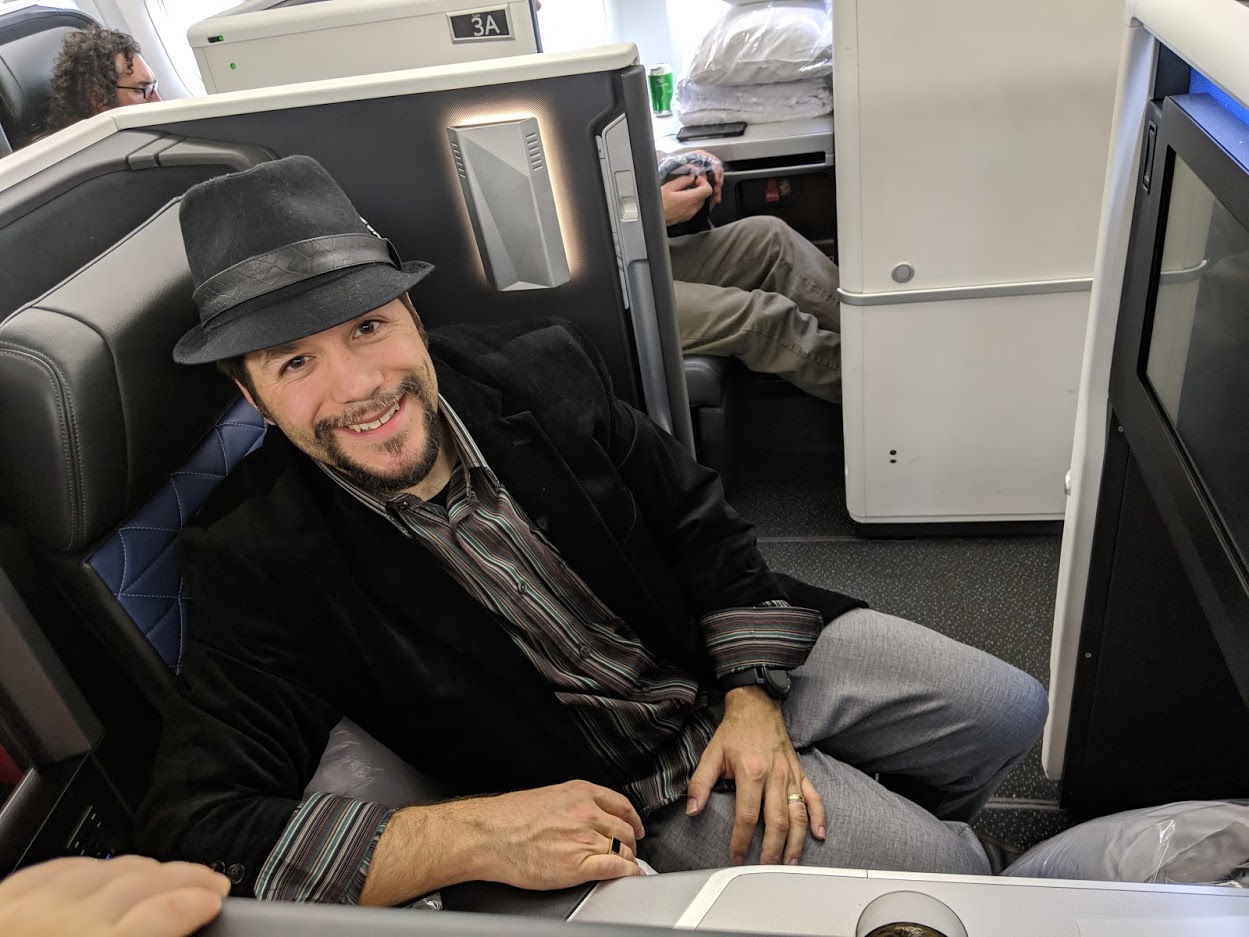
In the Internet age, I have frequently been known to say that if somebody has figured out how to do something, I can probably learn how to do it, too. No, I’m not going to become a brain surgeon by watching Youtube videos, nor can I “learn” to stand eight inches taller and dunk a basketball, but if somebody knows how to fix the trap in my sink or change the oil in my car or save for retirement or travel in luxury for less, I can probably figure it out, too. I’m sure that I can’t figure it out entirely on my own in most of those instances, and certainly not in one hour or one day, but there is probably a video / article / tutorial somewhere that I can follow and a free Internet forum where I can ask follow-up questions if I need help.
As a relative expert in one of the above topics, I can tell you that there are plenty of great blogs to read, videos to watch, podcasts to hear, and forums to get help when it comes to booking award travel. For starters, you’re here. We’re far from the only blog in this space and there are plenty of people making award travel content that flex strengths that we’re still developing and vice versa. We have a large online community in our Frequent Miler Insiders Facebook group (27,000 members and growing) where most questions can be asked and answered in short order. We host monthly live Ask Us Anything events, and we publish a weekly podcast. We also maintain a very comprehensive set of resource posts that you can find by clicking “Resources” at the top of any page on this site. Most people have neither the time nor the desire to consume all of it; the point is that there are endless resources.
An important related side note is that learning most worthwhile things takes time — so yes, there is a time investment in learning to master award travel. I’d argue that the time investment yields far more return than most things you would otherwise do with your free time — both from the cash value / savings perspective and the enhancement of vacation enjoyment/family time — but I am admittedly biased. Still, the time investment doesn’t need to be as big as you imagine. Once you get that first redemption under your belt, all this stuff seems a lot less intimidating (and a lot more exciting). It may even start to become intuitive with some practice.
The difference between booking award travel and getting your oil changed is that you aren’t going to find somebody to do the dirty work for you for $29.95. Yes, there are award booking services that can do the heavy lifting for you, and those provide a service that some people highly value thanks to the time savings. But back up to my example of a problem with the trap in your sink: you may be far better off if you watched a 3-minute video and got under the sink to reconnect the bar rather than paying a plumber to come out after-hours. There are times when you’ll really need that plumber’s expertise, but there are plenty of times when you could save yourself some money with relatively minimal effort. The same is likely true with award travel: some more complex tasks will require help for a newcomer, but there are plenty of easy awards waiting to be booked.
Like many other skills, you’ll get better at booking award travel with time and experience if it’s something you enjoy doing. And the truth is that I think it’s hard not to enjoy the feeling of knowing you got a lie-flat seat on an international ticket that would have cost thousands of dollars to buy with cash, but instead you used what feels like “monopoly money” (perhaps points you got for signing up for a credit card or three). Just be sure that you don’t really think of it as monopoly money since you do give up the opportunity to earn money (in the form of cash back) when you earn miles — and some transferable currencies could actually be turned into money. So don’t think of it as free travel but rather highly reduced-price (and increased luxury) travel.
In fact, to that last point, a friend recently made the point that he hates when people talk about their free travel using miles and points because he feels like it gives his family the wrong impression when he uses his hard-earned points to book them on high-end trips. It’s true that you’ll only be doing yourself a disservice if you convince those around you that trips are free when they do in fact require time, effort, and points that have value.
Award Travel Truths
The truths of award travel that you need to accept as a beginner are:
- You’re going to make some suboptimal redemptions. Somebody (probably somebody on the Internet) is going to tell you that you could have done this instead and saved that. Don’t get discouraged. This is part of the learning process. The bottom line is that you still got [insert amazing trip here] for [insert far less than the retail price]. And you also learned how to do it for less next time. Win-win!
- You’re going to need to look at booking travel differently if you want to take advantage of the best deals. More on this in a second.
- You’ll need some flexibility. This ties in with #2. If you’re completely inflexible with dates / times / airlines / itineraries, you’re probably better off earning cash back and buying airline tickets with your money in most cases.
- You will almost always have multiple ways to book a ticket, so it pays (in the form of savings) to figure out the methods available to you and then also explore which of those is the best of your options.
More on each of these below.
Suboptimal redemptions
When you start out with award redemptions, I think it is more important to do than to do perfectly. Don’t get me wrong, I don’t want you to pay Delta 225,000 miles for a flight that you could have booked with Virgin Atlantic for 50,000 miles.

However, neither do I think it serves you to obsess over optimal value on the first redemption or two. It can be easy to get bogged down with what Stephen often calls “analysis paralysis” and to feel overwhelmed at all of the things you might miss.
That said, it is smart to ask for help. I think it makes sense to check your work by running it by others. For instance, before you pull the trigger on that booking that you’re eyeing at 70,000 miles per passenger, ask in our Frequent Miler Insiders group whether there is a better way to book [insert your plan here]. Maybe somebody there can save you a chunk of miles per passenger.
Just accept that you will sometimes miss a better option and use those as learning opportunities to inform your next go round.
Looking at travel differently
If you’ve been drawn into this game by the promise of lie-flat seats on international flights, free-flowing high-end champagne, and fancy suites, you’re likely going to have to (at least somewhat) change your perspective on booking travel. To be clear, you can have those things, but you may need to adjust in other areas to get them.
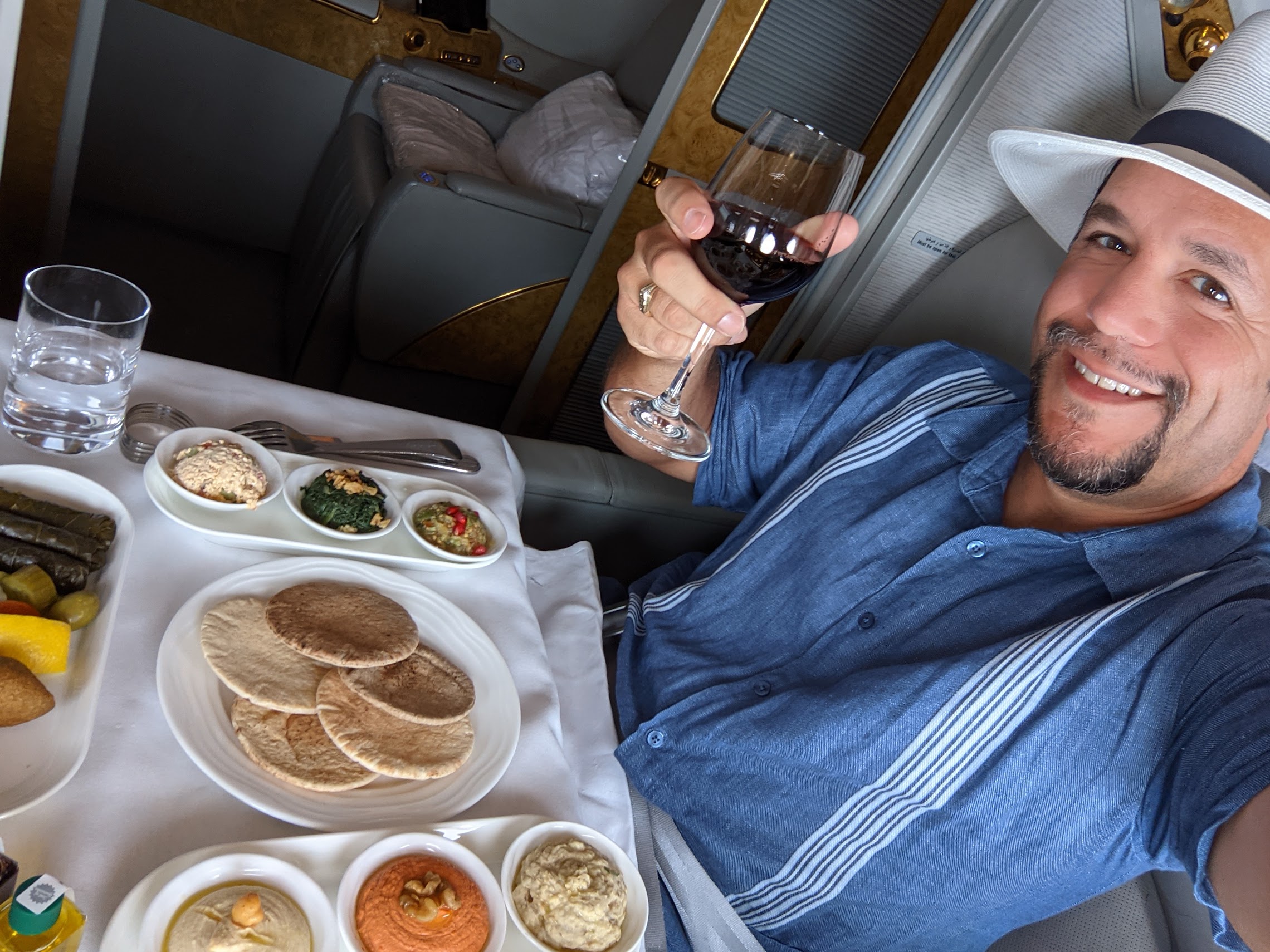
I mean that in a very multi-faceted way, but at the core is the need for some flexibility and that really starts at the planning stage.
Before miles and points, I would typically plan a trip based on knowing that I had a specific week available and a specific destination in mind and then it was just a matter of finding the best deal that fit my dates and destination requirements. However, it is hard (not impossible given some advance planning and a little luck, but hard) to achieve optimal award travel value if you approach trips in that way. I’m not saying that the “here are my dates and desired destination” approach is wrong or bad, just that you may need a willingness to look at things differently to enjoy the fruits of this game.
I find it best to be a bit more flexible — like “I’d like to visit Europe sometime next year” or “I’d like to visit a skiing destination in Asia in January”. With a little flexibility in the “when” and “where”, you open up the possibility of a far greater range of options.
While not quite impossible, good-value award travel is difficult to achieve with each layer of qualification (i.e. I only want to travel during these specific dates, I only want to go to this specific destination, I only want to fly out on a Friday after 5pm, I only want to fly nonstop, etc). Again, I understand that the reality for some people is that they need to set vacation dates far in advance, they are beholden to the school and activity schedule of their children, and some people just prefer flying nonstop. None of those things are impossible on their own, they just become more difficult as they get layered; taking a more flexible approach to one or more of those types of parameters opens up far more possibilities.
As a blogger, I obviously enjoy a great deal of time flexibility. Practice with award travel and the constant collection of points and miles has helped me adjust my outlook on trips. I am significantly more likely to book a long-distance trip based on award availability than I am to first narrow down a destination and then find availability to fit that specific destination. For instance, earlier this year we reported dates with 4 or more seats in business class on Fiji Airways (which is rare). At the time, I didn’t have it in mind to visit Fiji, but the chance to get there in 4 business class seats put it on my radar. Thankfully, I had the miles to jump on that availability. Now I find myself reading about Fiji and looking at flights to Vanautu and Samoa and finding intrigue in destinations that always sounded exotic (and those who know me know that I love a tropical beach as much as anyone) but that hadn’t been at the top of my bucket list necessarily. Award travel makes it possible for me to consider far-flung locales like those and the flexibility to be destination-open puts me in position to hop on awards like those.
Again, that’s not to say that you can’t decide that you want to see the Colosseum in Rome or The Great Migration in Tanzania or whatever might be on your bucket list and plan a trip around the place or event you want to see, my point is just that the more flexibility the better in finding awards.
If you are time and destination inflexible, cash back may be king
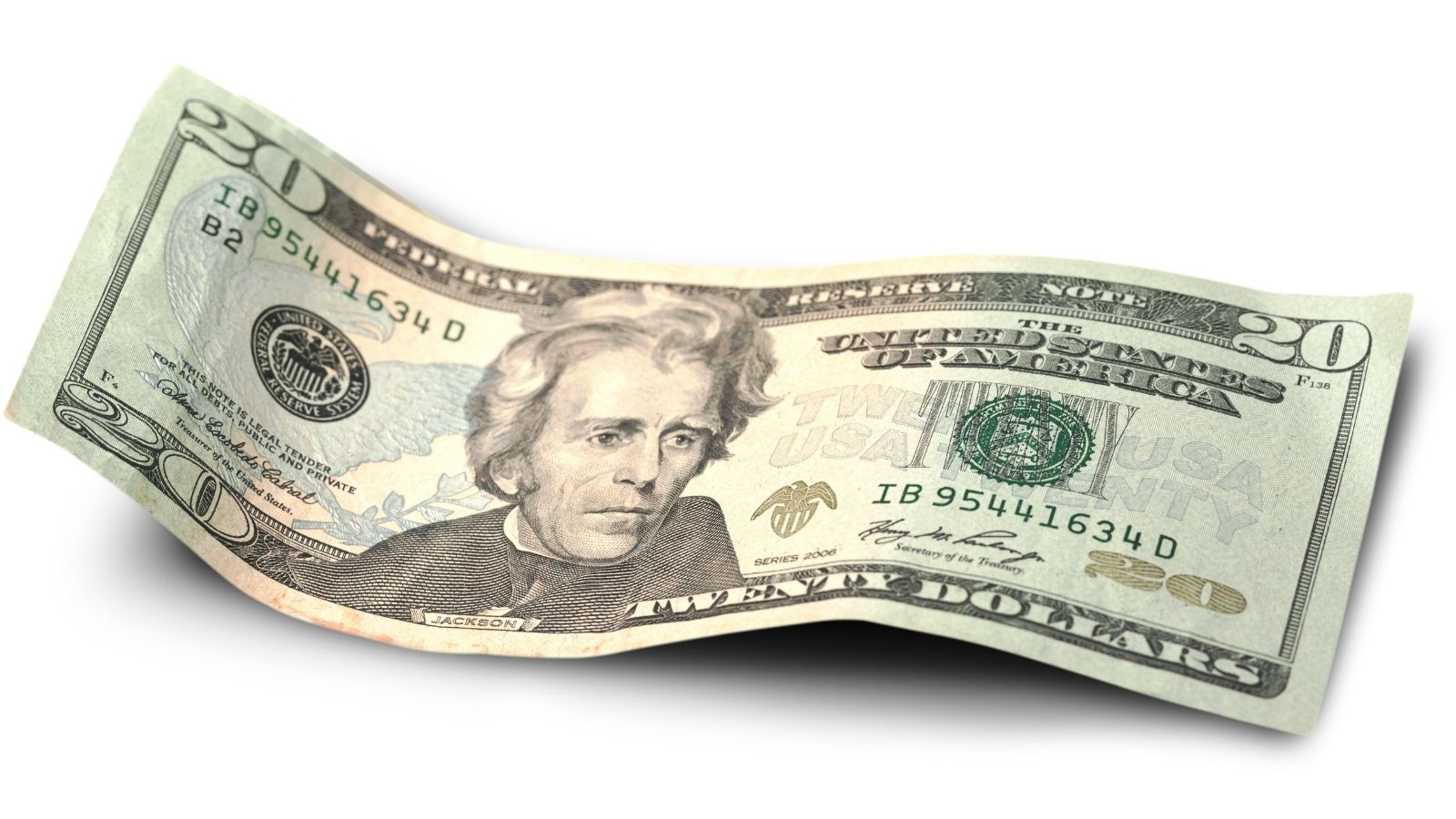
Finding award flights often requires being flexible with regard to time and/or destination. If you want to travel to Europe during peak summer travel dates, you’ll probably need to be flexible about where you fly to and from. For instance, I have two summer 2023 trips to Europe planned where my family of four will fly in business class, but those trips are designed around where I could find availability that fit our availability.
Booking awards on specific dates and routes is often a matter of luck (unless you have deliberately chosen dates during an off-peak season). In many cases, if you are date and destination inflexible, it might make more sense to focus on cash back and cash-like points that make almost any flight available.
For instance, I recently wrote about how the major US-based programs are moving more and more towards giving miles a fixed cash value toward flights. Most would be better off collecting cash back and using it to buy those flights than collecting individual airline miles if the primary goal were domestic travel (particularly during peak school break dates). Of course, a cash back strategy isn’t divorced from the idea of points and miles — you may consider using your Chase points for cash back or to book travel through Chase Travel℠ at a value of 1.25c or 1.5c per point or if you’re an Amex Business Platinum cardholder you may find slightly better than 1.5c value in using Membership Rewards points to book flights on your chosen airline.
Internationally, a cash back strategy works similarly with economy class flights. If you prefer to fly up front in business and first class, you’ll need to earn a lot more cash back and/or focus greater effort on finding great fares if you’re counting on credit card rewards to get you where you’re going, but it’s still not impossible — particularly in this environment where Amex keeps coming out with very generous welcome bonuses. Remember that with an Amex Business Platinum card, it is possible to cash out Amex points at 1c per point with an Amex Business Checking account and it’s possible to get 1.1c per point in value when redeeming points for deposits in a Schwab brokerage account if you have the Schwab Platinum card.
Learning about foreign transfer partners can save you big time
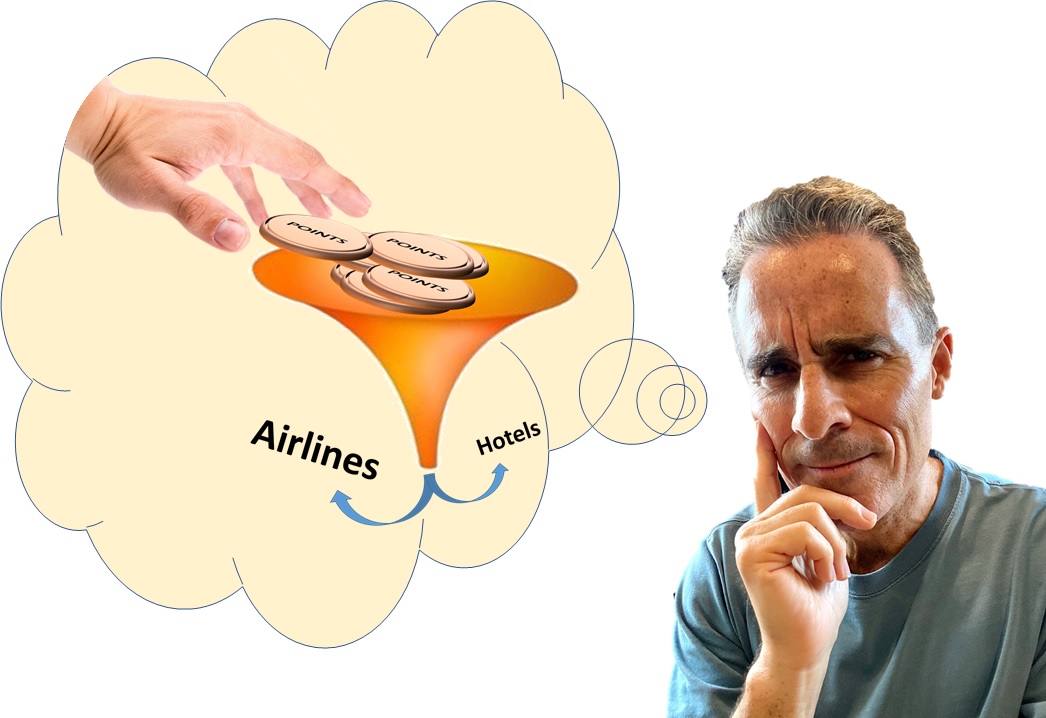
The single thing that newcomers tend to find most intimidating is transferring to foreign airline transfer partners. It’s not as difficult as it seems. While some programs are notoriously difficult to deal with (I’m looking at you, Turkish), many are very easy. There are programs like Air Canada Aeroplan that make it very easy to use your miles: just check a box on the home page to searching using miles and you might be able to save over other options.
For example, if you wanted to travel from Newark to London, United might charge you 62,400 miles one-way in business class.
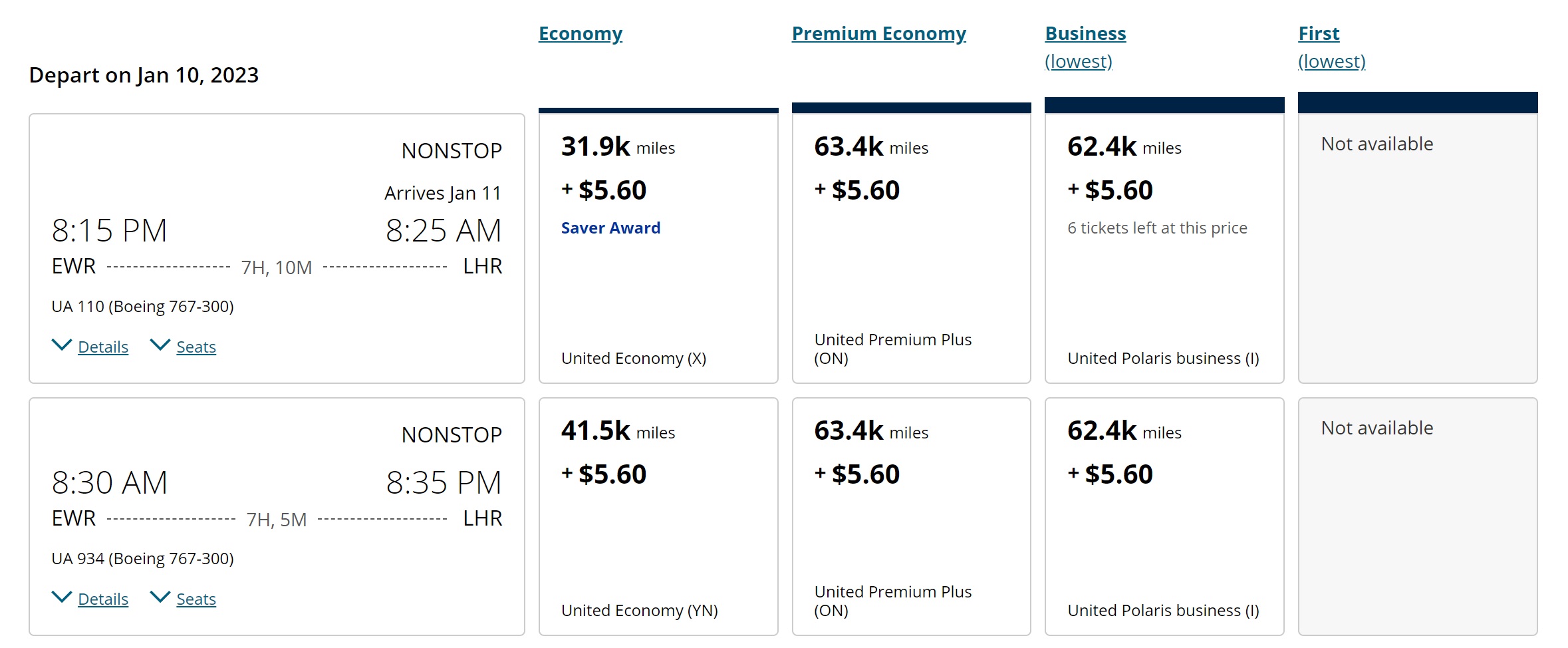
But you could save 2,400 miles per person by booking either of those same United Airlines flights via Air Canada Aeroplan (an Amex, Chase, and Capital One transfer partner) or Avianca LifeMiles (an Amex, Citi, and Capital One transfer partner).


While a savings of 2,400 miles isn’t huge, it could become a significant savings for a family (one of those flights shows six seats available, the other has more). It could get even more significant if there were a transfer bonus (we sometimes see transfer bonuses of 15-25% to Avianca LifeMiles). Air Canada allows a stopover on a one-way award, so for 5,000 additional miles (the cost to add a stopover on a one-way) you may be able to stop in London for a few days and then continue on to Zurich on Swiss. That said, since both Air Canada and Avianca have rather high change/cancellation fees, you might prefer booking directly through United in that cases. On the other hand, if you have a lap infant, you’re certainly going to want to book that through Air Canada since they only charge 2,500 miles for a lap infant. Different strokes for different folks.
But you can of course pay even less for the same flights: book through Turkish Miles & Smiles (a Capital One, Citi, and Bilt transfer partner) and pay just 45,000 miles and $5.60 one way for the same United Airlines flights — a savings of more than 17,000 miles per passenger one-way over what United would charge.
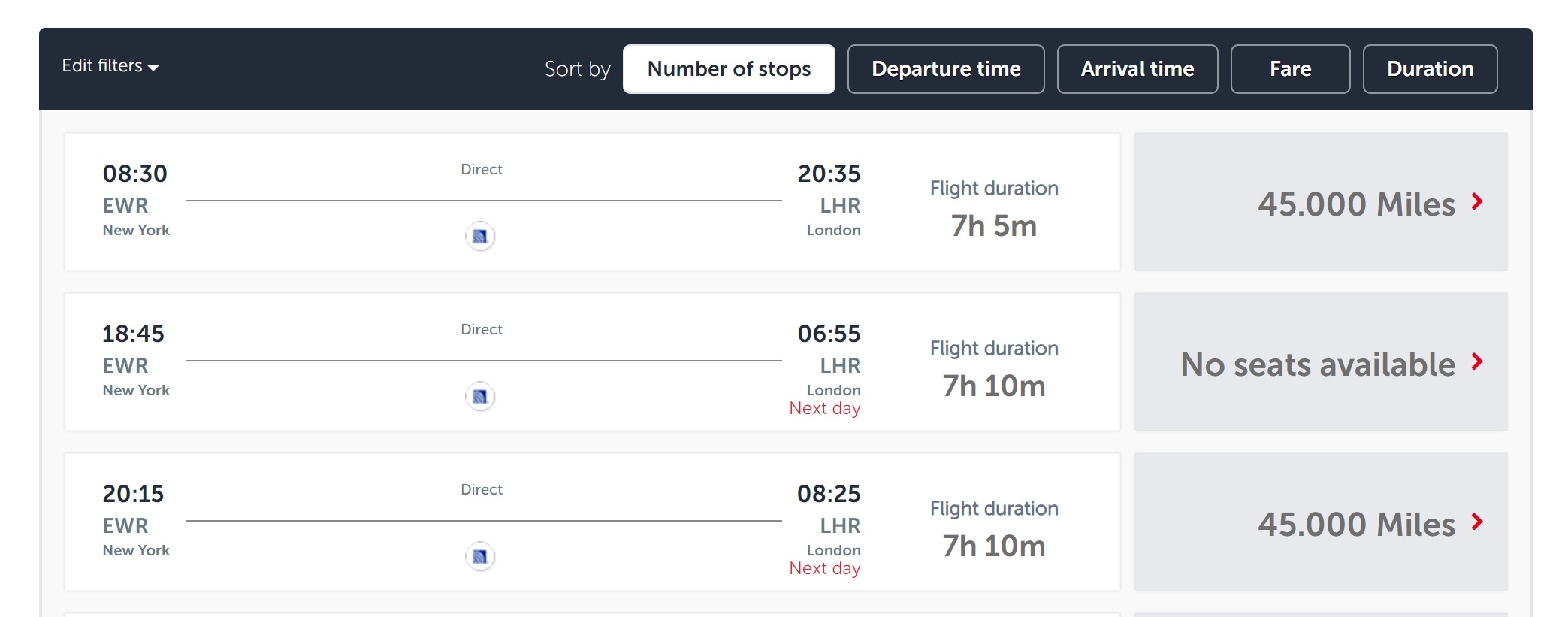
Turkish is notoriously difficult to deal with in the case of a schedule change or cancelled flight, but they only charge $25 to cancel an award and those business class awards to London can be booked online without much effort. I wouldn’t necessarily recommend Turkish as your first foreign airline program to master, but it provides a good example as to why it can be worth learning about foreign programs.
And it’s really not hard to book this stuff — logging into your credit card program, transferring miles, and booking awards can be as simple as a few clicks. Again, there are guides for that and Facebook groups and Internet forums. I don’t expect that a newcomer will see that United flight and know that it could be booked through Air Canada, Avianca LifeMiles, or Turkish (or better yet through ANA for just 88K round trip if you find a return on a Star Alliance carrier), but this is where posts on our Resources page and the help of Internet strangers can become invaluable.
You probably won’t make the optimal redemption the first time, but you can likely book that award. Once you do it once, it becomes far easier to do it a second time. Once you do it twice, you may just get hooked.
Bottom line
As we approach the new year, I know that many of us will make resolutions about what we want to achieve in the new year. In a time when travel is booming and prices are becoming more expensive thanks to increased demand, there will surely continue to be plenty of newcomers interested in our hobby. If that’s you, the good news is that you can indeed learn how to do this stuff — and when you do, you will likely enhance your travel or your enjoyment of it (or both). At the very least, you’ll probably either enjoy more travel for less or more money in your bank account given the amount you’ll save on flights and hotels. This hobby can be very enriching and it is more accessible than it first appears. With just a few adjustments to your outlook and a little time investment, it is possible to master the art of award travel. You’re off to a good start if you’re reading this — now resolve to expand your knowledge base in the new year. I am willing to bet it will be worth every extra minute you pour into it.


I fully agree with you Nick, though it calls my attention that there is a very important point that you did not mention: When you talk about saving miles flying United instead of Avianca for example, you should alert your followers on the real service of airlines like Avianca, where Business is much worst than Economy in United
I agree with all you say. However, the same can be achieved by being less verbose !! It took a lot of reading to get out the facts. I suggest please make it short and sweet !! Thanks.
I’d offer 2 friendly rejoinders.
Elites get to board the plane first. I’m the same way, getting where you want to go, when you want to go, is as much of a luxury as physical comfort. Sure it may be easier to fly on Tuesday of spring break week, but then you’re either taking a shorter trip, or getting back late. It takes planning, luck, but also the realization that it’s worth it to spend another 5-10k in miles to fly at the right time.
I agree you need flexibility, but if you are absolutely fixated on one perfect day, then the flexibility you need is being ready to book 360 days in advance, in different ways with different airlines. That’s how we’ve often booked holiday travel (economy).
Re cash back, the way I see it is that banks can get miles at under 1cpp so they’re willing to give them out more easily. That means that they’re effectively giving you a discount on the costs of travel. But that makes sense only to the extent you’re ready, able, and desiring to travel. Over and above that, you’re just locking yourself into inflexible currencies. Hence the beauty of transferable currencies and cashing out.
Thanks for an interesting post!
Like everything that is worth having in this life, you get out what you put in. If you are willing to invest 2 hours a few days looking for award flights or hotel availability, you will get better results than someone that reads a clicky article on website x or an YouTube video from y channel who then wants to replicate what they saw immediately.
My wife and I travel with three small children and points and miles allow us to do it in an affordable way. We see the travel as an investment into the education of our children. There are things that children will never be able to understand if they don’t experience it for themselves and see it with their own two eyes.
We are currently on a trip in Vietnam and this is my first time back to Vietnam since I left for the US when I was 7. My daughter would ask me about where I was born and I would show her videos of Vietnam but her comprehension about what she saw was very minimal. It wasn’t until we were walking the streets of the area I was born at, eating the food, talking to the people, and seeing the culture until my daughter realized that Vietnam is a real place and it’s different than the US.
We were sitting at a coffee shop in Da Nang and a little 5 year old girl came up to us selling lottery tickets. My daughter asked me what the little girl was doing and I explained to her that there are many children in Vietnam whose families don’t have money and the children need to help their parents earn money. I’ve shown her videos of children in other countries before and her school regularly run donation drives for communities that need help but when she saw that little 5 year old girl working with her mom made her realize what the world is like for many children like her. Experiences like these are invaluable and the typical cents per point fail at evaluating the true value of these experiences. So I will continue to spend 10+ hours of my week “plating the game”
Great article Nick. I remember when it was just Greg writing the blog. You all have contributed so much. Keep up the great work-we appreciate it!
I stumbled onto this blog and points right when the pandemic began. I accumulated over 2 million miles in under 18 months and well over 3 million now. I appreciate this post b/c at the beginning I had zero idea what I was doing. I am still easily confused to be honest but I have learned the hard lesson that what someone else THINKs points should be spent on or is a great redemption is not necessarily what is right for me. I wasted a few points booking a “must do” trip that was just eh for me. I find the collecting of the points exciting and get such a thrill with every referral but the spending of them is tough for me because I don’t desire the destinations that give me the best bang for the buck and those that are featured and discussed a lot. So sometimes I find myself in the wilderness on this hobby making odd redemptions but they suit me and I don’t regret them. Good post on a reminder that every redemption need not be stellar to be a GOOD redemption.
What is true about this game is that it has gotten less fun! When you do backflips to get miles and points in a program only for them to pull the rug from under you is nothing less than depressing………Alaska gutting their program……Hilton gutting their program……….more and more I just think going with cash is the answer…….
While I agree with the major thrust, one thing I don’t agree with is that it’s worthwhile for most people to deeply invest themselves in the world of points.
I have spent countless hours with this hobby and gotten lots of benefit from it, but I’m pretty sure the hourly wage hasn’t been good. It’s a great hobby for me because I enjoy the process. If someone doesn’t enjoy the process, I’d advise them to spend their valuable free time elsewhere.
This is probably the best post I’ve ever seen to encourage the discouraged beginner. Definitely starring this one in my email inbox when I get a bit discouraged, and well done Nick!
I dont fly a lot so is there a credit card spend on any card that will get me upgraded to first class? Like spend on everyday purchases not flights.
Ive been reluctant to do flight points because hotels give such value. I can stay a whole day in a hotel but a flight is only a couple hours. I only fly domestically too. Any benefit to flying with points in economy?
I have two kids so I maximize using points/miles coming primarily from signup bonuses by only flying economy. This year was Ecuador and the Galapagos, flying economy using the United Excursionist perk made it possible (just not sexy like sipping champagne in first class). 2023 is a Baltic cruise with 4 economy tickets to London for the departure and flying economy home from Paris. Pricing for 4 economy seats to Turkey by the end of 2023 is next. I’d rather take these three trips in economy than one in First Class, it just doesn’t make a “cents per mile” headline like booking a $10,000 seat using points. I credit sites like this for educating me but it does take hours, flexibility about where you travel to, and a love for bargain hunting to come to fruition.
Flying to/from UK costs horriblel fees. Fly toParis and take train. Use Dublin and take ferry/train with one ticket.
Big section in the article on how cash back is probably the better strategy for domestic economy flying.
My recommendation to anyone getting in this game is planning. Planning as far in advance as possible. A lot of recent (since COVID allowed) past trips and some future trips include cruises. The cruise is usually booked as far in advance as it becomes available, usually 2 years. That becomes my focal point of the trip as you can move it around much. Then the airlines are next usually a year later (varies by airlines how far in advance) and before and after the cruise and land portion allows me some flexibility on flight days, airlines, etc. Then I start booking hotels and excursions type stuff. Additionally, it really helps if you are proficient with spreadsheets. My card applications are a lot determined by obviously my trip points/miles requirements. Good Luck to anyone entering the game and lastly it does take some work which for me and I’m sure many reading this post is a labor of love.
It seems only days ago that Greg was looking for someone for this role. Wow, 6 years!
Congrats!
Nick!!! Speaking of height and dunking basketballs, you should reference Muggsy Bogues. At 5’3″, he was the shortest player in NBA history . . . and he was a first round draft pick!!! To your point, a person doesn’t have to fit into some mold to be successful in the hobby. As baseball great Ted Williams said, he had no natural talent for hitting, it was all practice and hard work.
I often get asked about the points and mileage game. A friend of mine (who makes a good living) wanted to start playing. The problem is, he doesn’t really travel much. He’s a homebody. So he first got an Alaska card except AS has very little service out of his home airport. He then got the Southwest cards with the companion pass but his wife hates to fly. He was kind of living vicariously through me.
Also, it’s important to know where in life you are. I’m an empty nester and could travel easily however, my parents and MIL are all in their mid to late 80s and in declining health. We’re kind of trapped at the moment and I’m staring at millions of points that are difficult to use at the moment. At least for far flung travel.
Earning the points is only valuable if you can use the points.
True that. My family member could have all the points and miles in the world, but his two beagles are children. I had to stop myself mid-brag about my latest brilliantly executed vacation when it occurred to me that will never be an option for him.
Use points/miles for family travel.
Cash them out and do some awesome experiences close to home. Fine dining, gifts, a scenic train ride, a nice hotel…you can have a blast, make memories, give them a good experience and not need to go far.